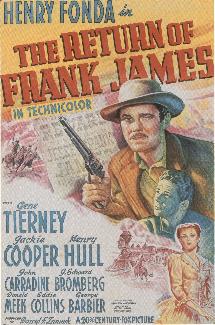
THE RETURN OF FRANK JAMES
US, 1940, 92 minutes, Colour.
Henry Fonda, Gene Tierney, Jackie Cooper, Henry Hale, John Carradine, Donald Meek, Russell Hicks.
Directed by Fritz Lang.
The Return of Frank James is the sequel to the very successful Jesse James which starred Tyrone Power in the title role and with Henry Fonda as his brother. This film is a vehicle for Henry Fonda, made much at the same time as his pivotal role in The Grapes of Wrath.
Jackie Cooper has a good role as his nephew, Cooper being an actor in these years (especially in The Kid with Wallace Beery) who then became a director of telemovies and television films (as well as appearing in the Superman movies). A very young Gene Tierney is charming in the rather feminist role of the young woman who wants to be a reporter in Denver. Henry Hale is Major Rufus Cobb, a supporter of the James brothers, John Carradine is Bob Ford, who killed Jesse James.
The film opens up the themes of the west. At this time there were not only films about the James brothers but Robert Taylor also appeared as Billy the Kid. These were the years of myth-making, just before the outbreak of World War Two. there was criticism of justice in the midwest, the role of the railroad builders and the bankers in dominating the ordinary people, taking their property for their own game, responsible for deaths. The outlaws are seen as vindicating justice rather than as criminals. Over the years there have been many assessments of the Jameses and Billy the Kid including The Great Northfield Minnesota Raid (directed by Phil Kaufmann) in the 1950s as well as American Outlaws (with Colin Farrell).
The Return of Frank James seems an unlikely assignment for German director Fritz Lang, best known for Metropolis and M before he fled the Nazis in 1933. He was to make other westerns including Western Union and Rancho Notorious.
1.American response to the James outlaws and the other outlaws of the mid-19th century? Overseas response? Heroes, villains, criminals?
2.The changing attitudes over the film history of the presentation of the outlaws? In favour? Critiques?
3.A film of 1940, the colour photography, the western settings? The ethos – America on the verge of World War Two?
4.The introduction, the killing of Jesse James at home, shot in the back by the Ford brothers? The Fords and their capitalising on this, their fame, the theatrical performance – as seen by the audience and watched by Frank? Bob Ford and his boasting, his fears, running from Frank James? The final confrontation with Frank and his death? The film’s condemnation of the Fords, especially in the testimony of Rufus Cobb?
5.The portrait of Frank James, the death of his mother, Jesse as an outlaw, the bank robberies, their fame? His retiring, working on the farm? Henry Fonda as the embodiment of the upright American character? His working with Clem? His working with Pinky? The news of Jesse’s death? His going to town, the feelings of vengeance but his control? Clem following him? The robbery, the death of the agent? The presumption that Frank had killed him? The escape, going to Denver, the pursuit of the Fords? The encounter with Eleanor, Clem telling the story? The attraction towards Eleanor? His leaving town, the pursuit of the Fords? His return, the arrest? His getting away, commandeering the train? Going to court, his defence? His being acquitted, Eleanor and her concern, a future? The irony of Clem and his attack on Bob Ford, his death? Frank James presented as an American hero?
6.Clem, the death of his father, his working with Frank? With Pinky? Young, inexperienced, feelings of vengeance? Following Frank? Trapping him in the office, escaping with the money? Meeting Eleanor, boasting, telling the story about the death of Jesse James? His participation in the pursuit, on the train? His not being involved in the court case? His trying to kill Bob Ford, his own death?
7.Cobb, his support of Frank? The publications? In the court, his defence – and his playing on the enmity between the North and the South, memory of the Quantrell Raiders, the carpetbaggers? Stirring up prejudice – ridiculing the prosecution? Getting the judge on-side?
8.The Stones, the family in Denver, the father as a publisher, allowing his daughter to be a journalist, her getting the scoop? Its being exposed by the railroad chiefs and the detectives? Eleanor and her continued support of Frank, Pinky and his being executed, her urging Frank to save him? Her father and the paper and the retraction?
9.Runyan, the railroad detective, against the James brothers, his working for Mc Coy? The pursuit of Frank, trapping him in Denver, exposing the story to Eleanor, his being put on the hook literally? His return to the court? Mc Coy, his vindictiveness against the James brothers, Frank taking his money and nobody else’s? His controlling the prosecution in the court? The prosecutor, his performance, his being ridiculed? The judge and his being on-side – and the immediate acquittal of Frank James, Pinky saved?
10.The range of characters filling out the film, in the town, the waiter at the hotel and the message for Eleanor, the preacher passing by, the performance of the death of Jesse James and the audience, the jurors in the court, those attending the trial? A rounded-out picture of a particular moment in American history – with the outlaws?